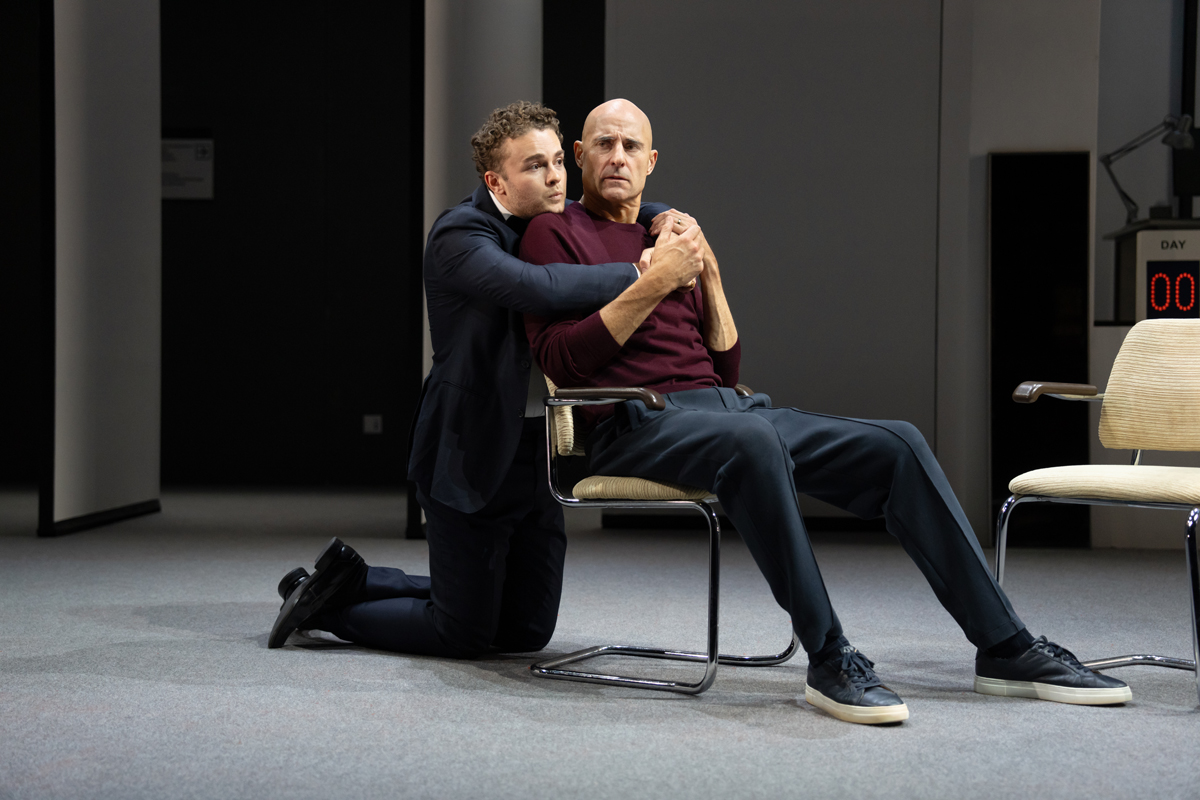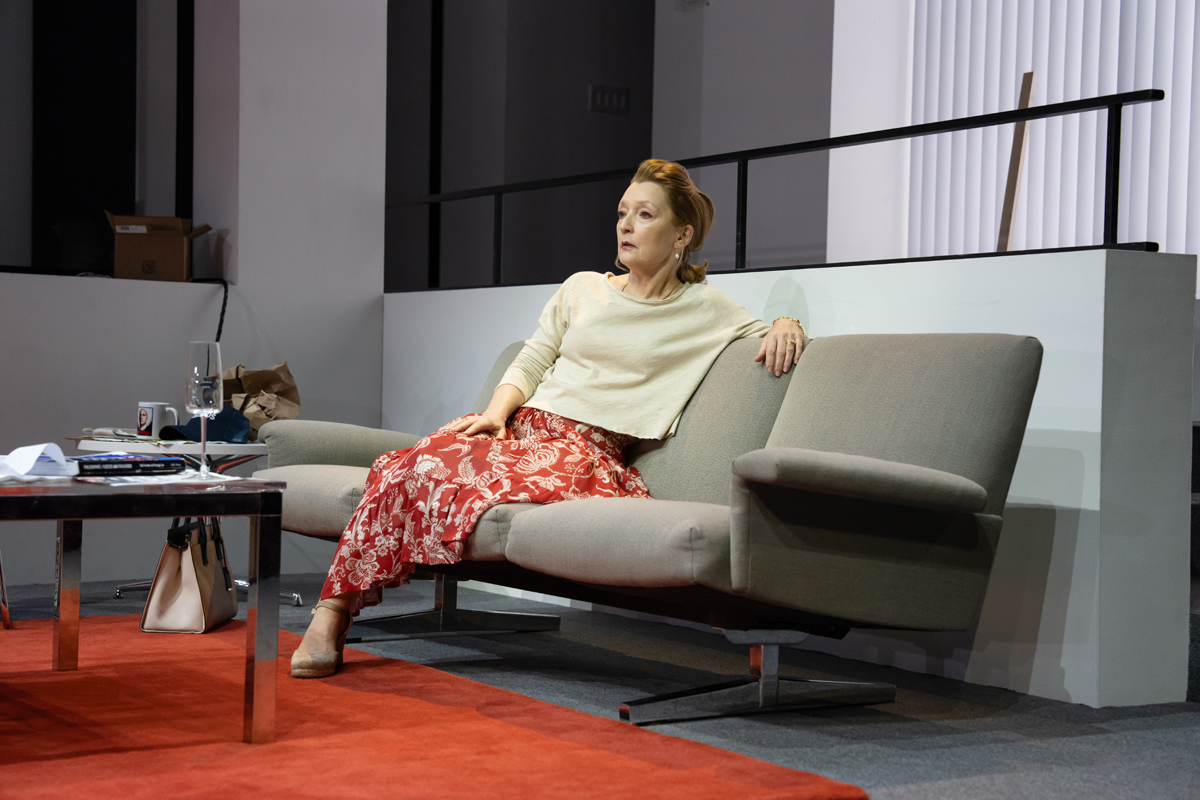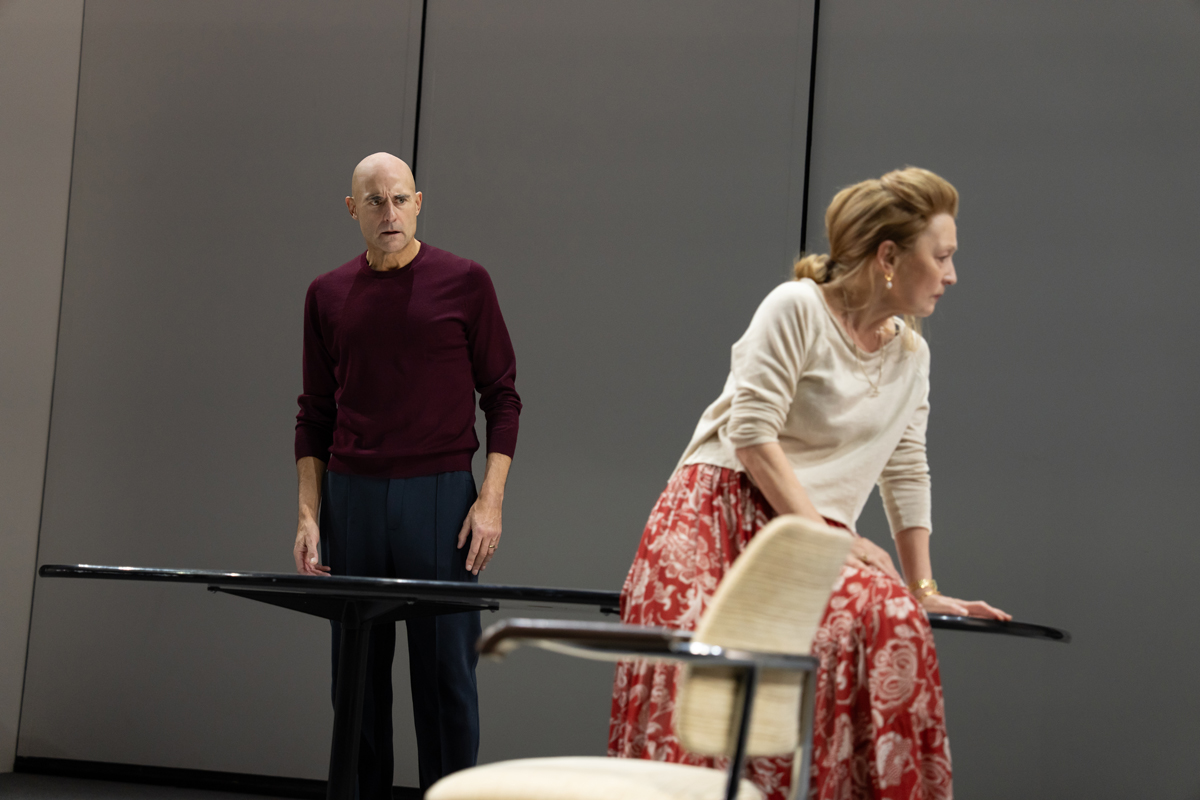 Rhoda Feng
Rhoda Feng
Robert Icke’s adaptation of Sophocles ventures into the arena of modern-day electoral politics.

Mark Strong as Oedipus and Samuel Brewer as Teiresias in Oedipus. Courtesy DKC/O&M. Photo: Julieta Cervantes.
Oedipus, written and directed by Robert Icke, adapted from Sophocles, Studio 54, 254 West Fifty-fourth Street, New York City,
through February 8, 2026
• • •
There is something inherently paradoxical about bonsaiing one of Western civilization’s most ancient tragedies into the brisk, short-jab arena of electoral politics—a realm where slogans fade faster than lawn signs and campaign vows dissolve on contact with the next poll. The British playwright and director Robert Icke leans into this friction from the first moments of his Oedipus, written “(long) after Sophocles.” The play begins with prerecorded footage: Oedipus (Mark Strong), facing a scrum of reporters, projects Obama-like calm as he holds forth on the illness of the civic body and the failures of those who have dragged the public sphere backward through lies and fearmongering. Unlike the Theban king of the original, this Oedipus freely concedes he has “no experience of political office” and is vying to become the ruler of this unnamed country. In the video, the charismatic candidate commits to two promises in a stray comment to the press: to release his birth certificate (a gesture meant to neutralize a familiar strain of birther antagonism) and to reopen the decades-old investigation into the mysterious death of Laius, the nation’s former leader, and first husband of Oedipus’s wife, Jocasta.

John Carroll Lynch as Creon (far left, standing), Samuel Brewer as Teiresias (far left, foreground), and Mark Strong as Oedipus (center right, background) in Oedipus. Courtesy DKC/O&M. Photo: Julieta Cervantes.
As the clip ends, Oedipus steps onstage and into a glass-walled campaign bunker to face Creon (John Carroll Lynch), his brother-in-law and beleaguered speechwriter, who immediately bristles at Oedipus going off book; whatever tonight was meant to be, it wasn’t an occasion for unvetted vows. Their postmortem reaches a pitch just as a blind man appears in the room, cowering in a begrimed tank top and sweatpants. He is later identified as Teiresias (Samuel Brewer), a member of a “future-telling” cult. Icke’s near-feral prophet tells Oedipus that, in the case of Laius’s death, “you yourself are the killer you seek” and indicts him as “your father’s killer—and your mother’s lover.” Creon sneers at his cultish theatrics; Oedipus, after trouncing the “fraud,” orders him to be escorted out. But the accusation lodges like a splinter. A countdown clock near the back of Hildegard Bechtler’s appropriately austere, half-emptied set quietly ticks toward zero—the moment when election results will be announced and the veil will be fully lifted from Oedipus’s (and a few audience members’) eyes.

Jordan Scowen as Eteocles, Olivia Reis as Antigone, Mark Strong as Oedipus, Lesley Manville as Jocasta, James Wilbraham as Polyneices, Anne Reid as Merope, and Bhasker Patel as Corin in Oedipus. Courtesy DKC/O&M. Photo: Julieta Cervantes.
Icke’s Oedipus, which had a run in London last fall, announces its own ironies with an exuberant overtness. In the course of the evening, Jocasta (a terrific Lesley Manville) organizes a surprise celebration for Oedipus’s anticipated win—a party that doubles as a farewell fete for her longtime bodyguard, Corin (Bhasker Patel), who has served her family for fifty-five years. At a certain point, Oedipus’s son Polyneices (James Wilbraham) sneaks up behind his father and covers his eyes—the kind of foreshadowing Icke is unembarrassed to italicize. (Ismene, the chorus, and the priest of Sophocles’s prologue are all AWOL from his intermission-less remake.)

James Wilbraham as Polyneices and Mark Strong as Oedipus in Oedipus. Courtesy DKC/O&M. Photo: Julieta Cervantes.
The director, known for modern, post-Freudian adaptations of classics like Hamlet, Oresteia, and The Doctor, has compared his dramatic approach to retouching an old painting, yet the analogy obscures his bold departures from Sophocles. One deals with Icke’s treatment of prophecies. In the Greek tragedy, Oedipus first hears the felling forecast, about killing dad and marrying mom, as a young man; in Icke’s version, Teiresias divulges the truth to an Oedipus who is in his fifties and has already unwittingly done the deeds. Strong’s politician hardly gives the impression, at first, of a man wracked by existential anguish. It also emerges here that Oedipus killed Laius not because of an altercation on the road but in a car accident. When a chauffeur (Teagle F. Bougere) is summoned to Oedipus’s campaign bunker thirty-four years later to recount the details, the would-be ruler feels the first tremor of recognition, a spreading subcortical unease. Strong plays Oedipus as a man whose intellect outruns his emotional preparedness. Jocasta is ready to drop the matter of Laius’s death “to the bottom of the ocean,” but her husband-son, revealing a stubbornness and fine-print mind, is determined to sound the depths of the past until all is revealed.

Lesley Manville as Jocasta in Oedipus. Courtesy DKC/O&M. Photo: Julieta Cervantes.
Where Icke diverges most forcefully from Sophocles is in enlarging the roles of Jocasta and Merope (Anne Reid), Oedipus’s adoptive mother. Jocasta’s backstory—she was impregnated by Laius at thirteen and compelled to abandon the infant (Oedipus) to protect her future betrothed’s reputation—casts her not as a figure caught in a mythic trap, but as someone shaped by predatory, patriarchal cruelty before Oedipus was even born. Manville charts Jocasta’s path with a nimbleness that keeps her history well wrapped in wool until she chooses to unravel it. If Sophocles’s Jocasta is a figure who exists primarily in relation to the men around her, Icke supplies her with a political intelligence that at times approaches Lady Macbeth’s: she steadies Oedipus’s nerve, cautions him against spiraling on “the night you become the most powerful man in the country,” and tries in vain to keep him from reopening old wounds. Her late speech about her marriage to the much-older Laius holds the room breathless even as the writing itself edges toward over-explanation.

Anne Reid as Merope and Olivia Reis as Antigone in Oedipus. Courtesy DKC/O&M. Photo: Julieta Cervantes.
Merope carries the secret that holds the entire plot at bay. She drifts in and out of the headquarters with a tight, almost haunted restraint, as if torn between the compulsion to speak and the terror of what her words will unleash. Yet her prolonged reticence—waiting until deep into the play to reveal that Oedipus was adopted, that she found him abandoned in the woods as a baby—strains credulity. It is one of the more conspicuous signs that Icke must labor, in sometimes contrived fashion, to keep an uber-rational Oedipus from cracking the riddle of his identity too early.

Mark Strong as Oedipus and Lesley Manville as Jocasta in Oedipus. Courtesy DKC/O&M. Photo: Julieta Cervantes.
Icke deploys the countdown with watchmaker precision, letting the minutes, then seconds evaporate as characters circle Oedipus with tidbits of information, with warnings, with memories they think innocuous. Strong’s chemistry with Manville is startlingly alive—tender, erotic, even playful early on, which only deepens the horror when the final stained-glass pieces fall into place. One of this interpretation’s most beguiling scenes comes after Oedipus’s famous anagnorisis: ravaged by the knowledge of Oedipus’s true origin, he and Jocasta cling to each other in one last jagged embrace. They kiss with the force of those still in love and nearly collapse back into intimacy before Jocasta tears herself away, dragging her body along the floor to escape him. Icke’s innovation drives home the idea that peripeteia—or reversal of fortune—exacts its steepest toll not in the public realm, but in their shared, private life.

Mark Strong as Oedipus and Lesley Manville as Jocasta in Oedipus. Courtesy DKC/O&M. Photo: Julieta Cervantes.
Not everything in this production lands. The comic insouciance with which incest is sometimes invoked skews broad. The pruning of prophecies occasionally leaves the plot looking too much like a chain of far-fetched coincidences, and Oedipus’s downfall the regrettable result of incomplete information. Still, if Icke’s style favors lucidity over rituals and supernatural elements, his translation retains a grand, metaphysical bleakness. While the original Oedipus suggests that fate mocks human intention, here, fate has no divine musculature; it functions instead like an impersonal pressure, a force that overwhelms even the most deliberate attempts at self-determination.
When the final seconds on the countdown clock flicker away and the stage is stripped bare, we witness a man who believed in reason and transparency confronting the obdurate truth about his origins. The image of a sightless man, alone, pierced by the very arrows he has loosed, has been with us for nearly 2,500 years, but still has the power to disturb. Which is one definition of a classic: something that ages but never grows old.
Rhoda Feng is a freelance writer based in Washington, DC.